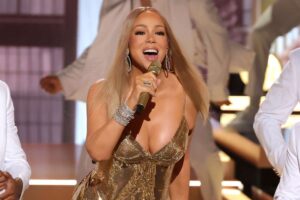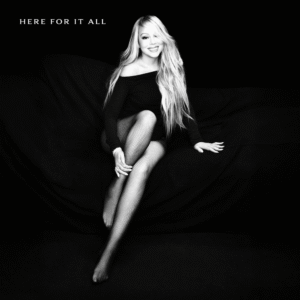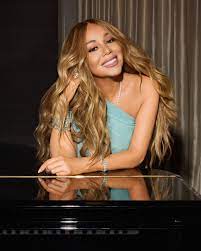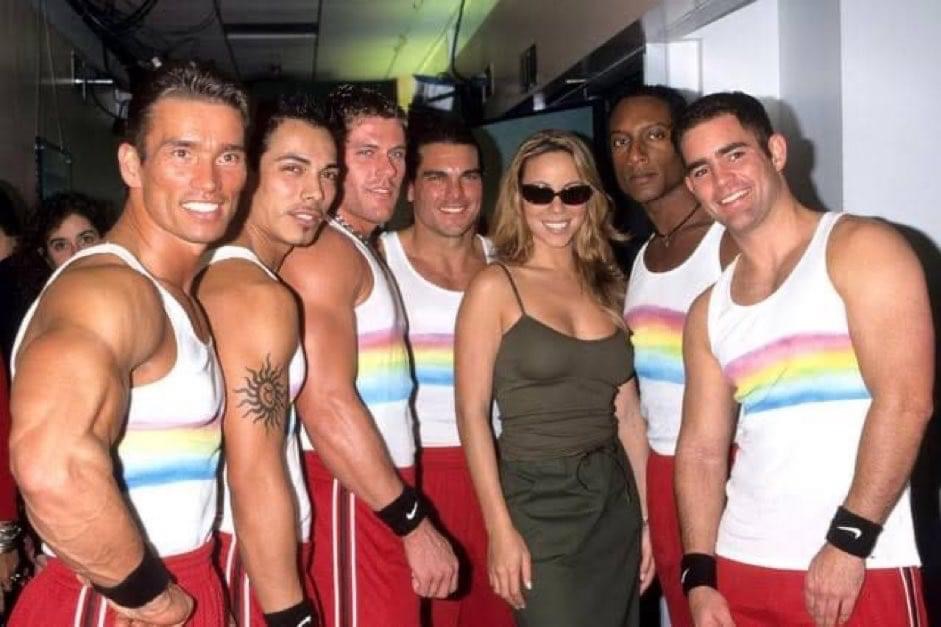
Mariah Carey, globally recognized pop diva, has left an indelible mark on the music industry with her unparalleled vocal range and numerous chart-topping hits. Beyond her musical achievements, Carey has also made significant contributions to the LGBTQ+ community. Her influence extends beyond her artistic prowess; it encompasses her activism, advocacy, and the deep connection she shares with her LGBTQ+ fans.
As we celebrate Pride Month, Mariah Carey has once again delighted fans with a new collection of Pride merchandise honoring her iconic album “Rainbow.” In a special tribute, she has moved up the 25th anniversary celebration of her November 1999 album to June 2024, promising something extraordinary in its honor. However, Mariah’s impact on the LGBTQ+ community extends far beyond a rainbow t-shirt and an album titled “Rainbow.” While she may not always be at the forefront of protests, Mariah has consistently demonstrated her alliance and support through her discourses and her powerful songwriting. Her music has been a saving grace for many struggling teens, offering solace and strength amid the challenges of homophobia and bullying. Through her lyrics, she has helped alleviate the confusion and despair that many have faced, providing hope and resilience to make it through the rain.
Mariah Carey’s Personal Connections with the LGBTQ+ Community
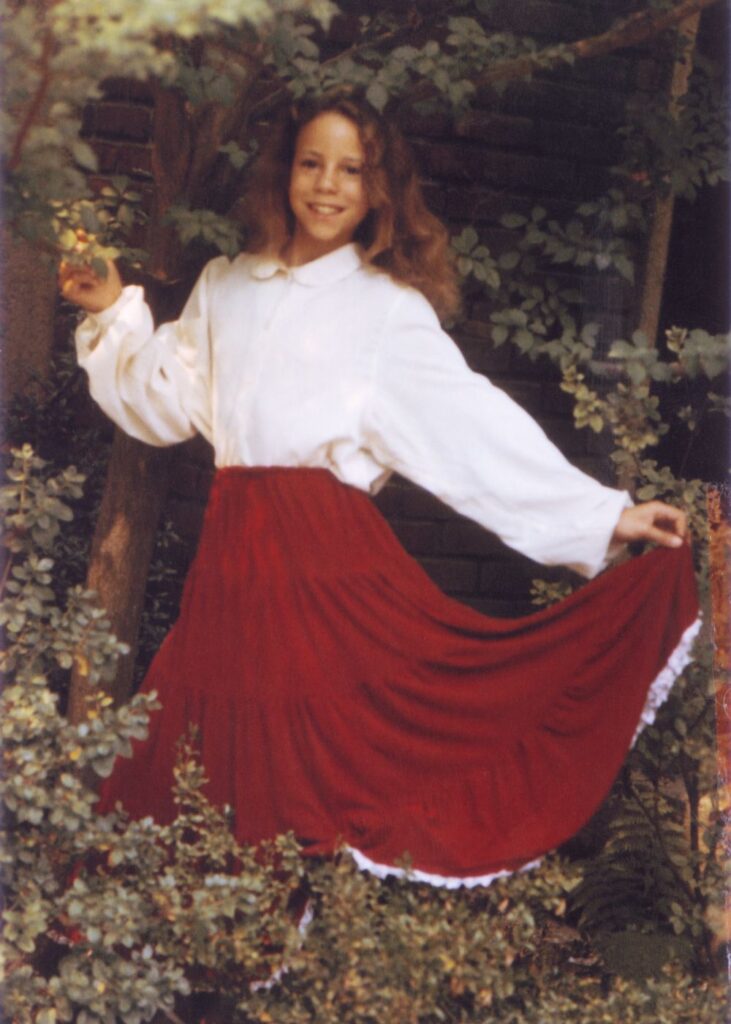
It is no secret that Mariah Carey’s childhood was marked by racism, absent parenting, and chronic family instability. However, as she recounts in her memoir, she found love and security in the embrace of her two gay “uncles”, whom she affectionately calls her “guncles.”
Her guncles, Burt and Myron, were among her favorite people. Myron, a homemaker, left a lasting impression on her with his impeccable dress sense and well-styled hair, creating a special bond between them. Burt, a photographer, would stage Christmas-themed photoshoots with the trio, making Mariah feel at home.
Carey recalls Christmas at home as a time of family arguments and all she could do was cry and wish the arguments would cease. She yearned to escape to a place that truly felt like the holidays, longing for the Christmas magic that so many children dream of experiencing. However, one holiday, when a storm hit, she found herself stuck at her guncles’ house, and experienced her first loving Christmas. This experience sparked her lifelong obsession with the holidays.
With the love of her guncles and the bohemian crowd her opera-singing mother used to bring home, Mariah recalls: “Since I was a little girl, my mother has been very open-minded and had many different types of friends, so being gay never seemed wrong or strange to me“—which for the 70s and 80s, was a whole new level of “open-mindedness”.
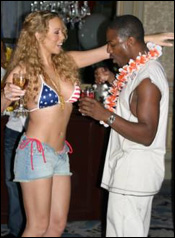
Since then, Mariah has consistently surrounded herself with LGBTQ+ friends and music professionals throughout her life and career. Recruiting Trey Lorenz as one of her first background singers, a partnership that continues to this day, and engaging in numerous remix collaborations with David Cole, as well as her public friendship with makeup artist Kristofer Buckle, all underscore how the “normalcy” she experienced growing up has endured despite years of societal divide and homophobia.
Although this may not come as a surprise in today’s more progressive generation, representation matters. In an era when the LGBTQ+ community was rarely visible in media and the internet was still in its infancy, seeing a global legend like Mariah Carey surrounded by friends who looked and loved like you offered a glimmer of hope. It reassured many that they were not alone or strange after all.
The Diva and Her LGBTQ+ Following
A significant portion of the LGBTQ+ community often speaks of Mariah Carey, the diva. The male gay community, in particular, is known for its admiration of divas—the glamour, the fabulousness, the excess. These qualities have been revered for years, with many gay men emulating the divas’s gestures and sass, especially in drag performances.
Carey’s extravagant persona, combined with her unapologetic embrace of glamour and femininity, has endeared her to LGBTQ+ audiences. Her over-the-top style, diva attitude, and the authenticity with which she presents herself align closely with the experiences of many in the LGBTQ+ community who embrace their identities in the face of societal norms.
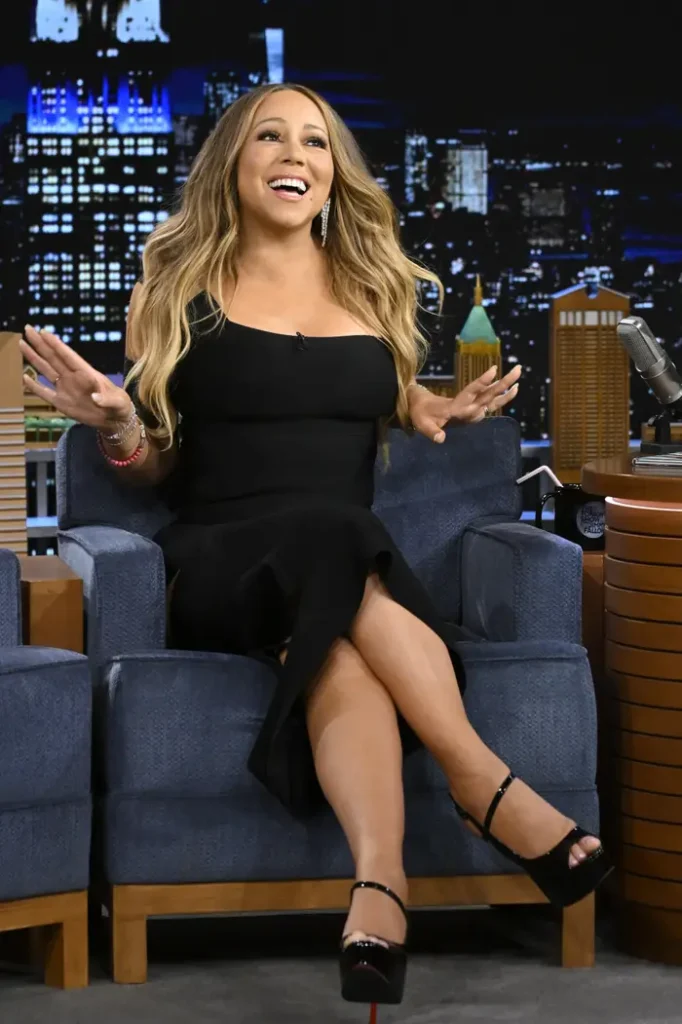
However, it was in her early years of songwriting that many 90s fans found solace. During a time when coming out was not widely celebrated and gay representation was often absent, Mariah’s music provided a sense of comfort and understanding.
“Make It Happen,” released in 1991, stands as one of Mariah’s earliest songs of hope. The line “I often cried myself to sleep but still I had to keep on going” from the second verse resonated deeply with boys and girls who were bullied to the point of tears for being different.

However, it was the worldwide success of “Music Box” that truly brought Mariah’s messages of faith and hope to the forefront, particularly through the songs “Hero” and “Anytime You Need a Friend.” Despite Mariah initially not being a fan of “Hero” and not intending to sing it herself, she has acknowledged the countless fans who have shared how the song’s message literally saved their lives.
Andrew Chan, author of “Why Mariah Carey Matters,” reflects on his feelings of queerness and being an outcast through the lyrics of Outside: “Feeling there’s no one completely the same, standing alone” resonated deeply with him as a gay Chinese-American man, capturing his sense of isolation and relatability.
Ian Eagleton, author of “Glitter Boy,” emphasizes the impact of Mariah Carey’s song Can’t Take That Away: “When I was 14, the song reassured me that the school bullies who were ramping up their campaign of terror could not take away all the things that made me special.”
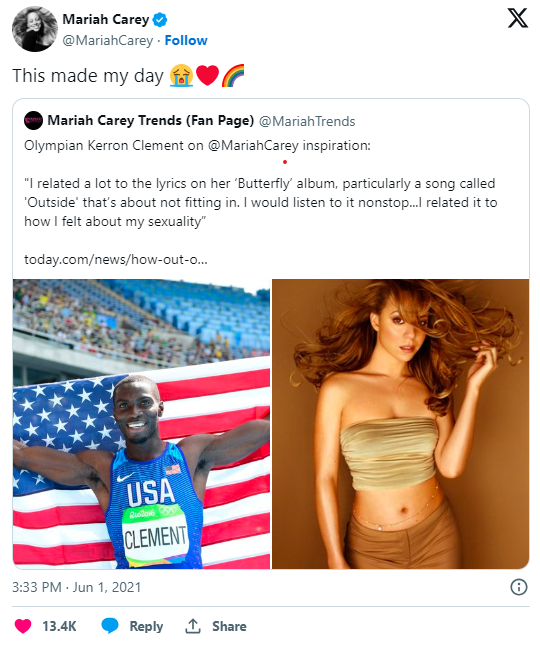
In an interview with Turkey’s GayMag, Mariah clarifies “A lot of my die-hard gay fans don’t just know my singles, but they also know all the album cuts. I have songs about feeling different and alienated, because I grew up with my own issues, being biracial and not having money. Some of those lyrics can apply to anybody who feels different. My die-hard gay fans listen to songs like ‘Outside’ and ‘Close My Eyes,’ songs that most people wouldn’t know, and these songs have become anthemic for them for their own personal reasons.”
Thousands of testimonials have been documented about how Mariah Carey’s poignant lyrics and uplifting messages have helped people through their darkest times. Songs like “Looking In,” “Through the Rain,” “My Saving Grace,” and more recently, “Portrait,” may not specifically address LGBTQ+ struggles, but their messages are universal: loneliness and hardship may come, but they too shall pass. Mariah Carey herself personifies the strength to overcome adversity: from poverty to global success, from the setbacks of “Glitter” to the triumph of “The Emancipation of Mimi,” her message to the world remains clear: “Don’t ever count me out!”
Advocacy and Allyship
Mariah Carey’s support for the LGBTQ+ community also extends beyond her music. She has been a vocal advocate for LGBTQ+ rights, using her platform to speak out against discrimination and promote equality.
Representation in media and entertainment is crucial for marginalized communities, and Mariah Carey has played a significant role in increasing LGBTQ+ visibility. Her music videos, performances, and public appearances often include LGBTQ+ themes and imagery, providing positive representation for a community that has historically been underrepresented. In her music video “I Want to Know What Love Is,” Carey includes a diverse cast of expression of love, reflecting her commitment to inclusivity.
In a 2016 interview with Billboard, Carey acknowledged this deep connection, saying, “The LGBTQ+ community has always been a part of my life and has always been there for me, and I will always be there for them. They inspire me with their courage and resilience“.
In a 2018 interview with The Advocate, Carey discussed the importance of visibility, stating, “Seeing people who look like you, who love like you, and who live like you represented in the media is so important. It helps to break down barriers and create a more inclusive world“
After her Brighton Pride headline performance was canceled in 2020 due to the COVID-19 pandemic, Mariah Carey made a triumphant return for her LGBTQ+ fans in 2023 at LA Pride in the Park. She not only delivered stunning performances of her hits but also shared messages of love and hope. Her intro to “Obsessed,” even featured a backdrop referencing a Grindr conversation with the line: “Why are you so obsessed with me?” leaving her gay fans ecstatic.
In 2013, Mariah Carey accepted Out Magazine‘s “Artist of the Year” award on behalf of her openly gay friend, Lee Daniels. She humorously remarked, “I’m a straight girl, so I don’t really know why they asked me to be here – but my boobs have been out for years,” before going on to praise her good friend.
Later in 2016, Mariah Carey was honored with an Ally Award at the GLAAD ceremony, this time introduced by Lee Daniels himself. Adding her own touch of humor, she redefined the LGBTQ acronym: “L for Legendary, G for Gorgeous, B for Beautiful, T for Tantalizing, and Q for Quality.”
For the movie “Bros,” the first gay rom-com to be distributed by a major movie studio, Mariah Carey not only contributed to the soundtrack with “Heartbreaker / If You Should Ever Be Lonely,” but also joined her good friend Billy Eichner, the film’s executive producer and lead actor, to host the advance screening in New York City. This event celebrated a significant milestone in LGBTQ+ media representation.
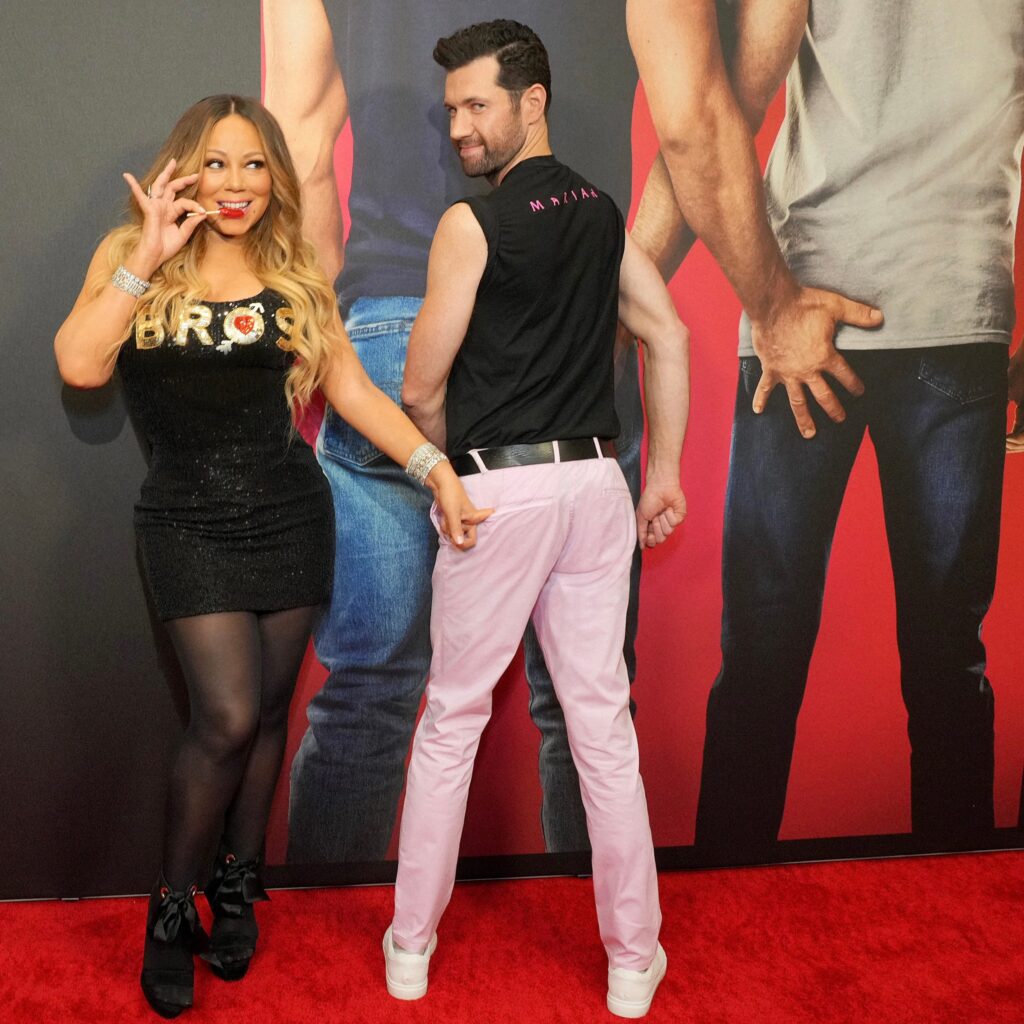
In recent years, Mariah Carey has taken to social media each June to wish her fans a Happy Pride. She often showcases ensembles inspired by her “Rainbow” album and has recently delighted fans by offering Pride-themed merchandise.
Mariah Carey’s impact on the LGBTQ+ community is profound and multifaceted. From her powerful music that has provided solace and inspiration to her unwavering advocacy for equality and representation, Carey has become a beloved figure and a true ally. Her influence extends beyond her artistic achievements, encompassing her personal resilience and dedication to creating a more inclusive and accepting world.
Carey’s enduring legacy is one of empowerment, inclusivity, and love. Her music will continue to resonate with LGBTQ+ individuals, providing comfort and strength, while her advocacy will inspire the ongoing fight for equality and justice. As we celebrate Mariah Carey’s contributions, it is clear that her impact will be felt for generations to come, making her a true icon and champion for the LGBTQ+ community.
“It’s OK to be who you are, no matter who you are – and love accordingly” – Mariah Carey
